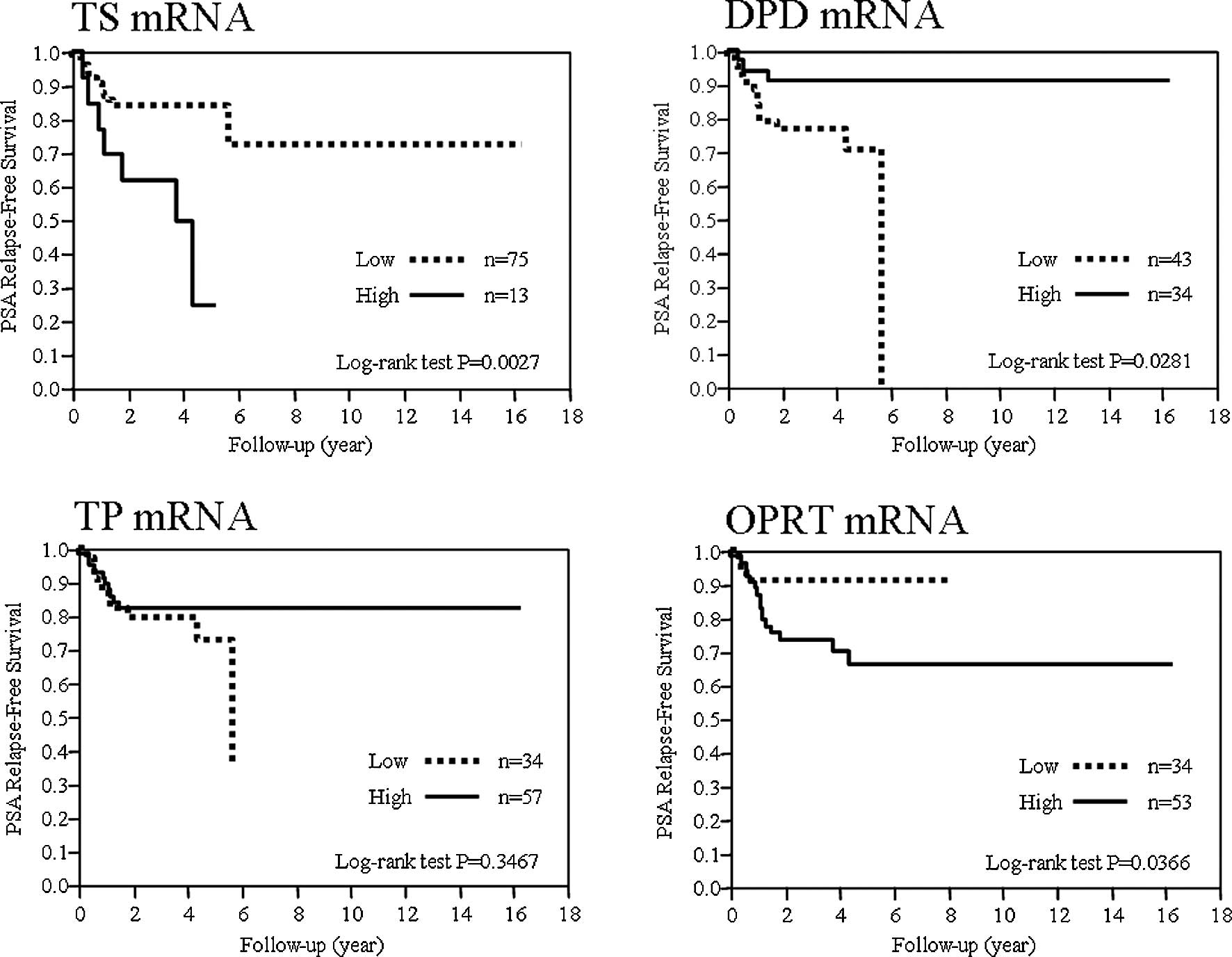|
1
|
Mok TS, Wu YL, Thongprasert S, et al:
Gefitinib or carboplatin-paclitaxel in pulmonary adenocarcinoma. N
Engl J Med. 361:947–957. 2009. View Article : Google Scholar : PubMed/NCBI
|
|
2
|
Heggie GD, Sommadossi JP, Cross DS, Huster
WJ and Diasio RB: Clinical pharmacokinetics of 5-fluorouracil and
its metabolites in plasma, urine, and bile. Cancer Res.
47:2203–2206. 1987.PubMed/NCBI
|
|
3
|
Van Kuilenburg AB: Dihydropyrimidine
dehydrogenase and the efficacy and toxicity of 5-fluorouracil. Eur
J Cancer. 40:939–950. 2004.PubMed/NCBI
|
|
4
|
Danenberg PV: Thymidylate synthetase – a
target enzyme in cancer chemotherapy. Biochim Biophys Acta.
473:73–92. 1977.
|
|
5
|
Pinedo HM and Peters GF: Fluorouracil:
biochemistry and pharmacology. J Clin Oncol. 6:1653–1664.
1988.PubMed/NCBI
|
|
6
|
Longley DB, Harkin DP and Johnston PG:
5-Fluorouracil: mechanisms of action and clinical strategies. Nat
Rev Cancer. 3:330–338. 2003. View
Article : Google Scholar : PubMed/NCBI
|
|
7
|
Peters GJ, Laurensse E, Leyva A, Lankelma
J and Pinedo HM: Sensitivity of human, murine, and rat cells to
5-fluorouracil and 5′-deoxy-5-fluorouridine in relation to
drug-metabolizing enzymes. Cancer Res. 46:20–28. 1986.
|
|
8
|
Peters GJ, van Groeningen CJ, Laurensse EJ
and Pinedo HM: A comparison of 5-fluorouracil metabolism in human
colorectal cancer and colon mucosa. Cancer. 68:1903–1909. 1991.
View Article : Google Scholar : PubMed/NCBI
|
|
9
|
Fukui Y, Oka T, Nagayama S, Danenberg PV,
Danenberg KD and Fukushima M: Thymidylate synthase,
dihydropyrimidine dehydrogenase, orotate phosphoribosyltransferase
mRNA and protein expression levels in solid tumors in large scale
population analysis. Int J Mol Med. 22:709–716. 2008.
|
|
10
|
Li Y, Mizutani Y, Shiraishi T, et al:
Prognostic significance of thymidylate synthase expression in
patients with prostate cancer undergoing radical prostatectomy.
Urology. 69:988–995. 2007. View Article : Google Scholar : PubMed/NCBI
|
|
11
|
Emmert-Buck MR, Bonner RF, Smith PD, et
al: Laser capture microdissection. Science. 274:998–1001. 1996.
View Article : Google Scholar : PubMed/NCBI
|
|
12
|
Ichikawa W, Takahashi T, Suto K, et al:
Thymidylate synthase predictive power is overcome by irinotecan
combination therapy with S-1 for gastric cancer. Br J Cancer.
91:1245–1250. 2004. View Article : Google Scholar : PubMed/NCBI
|
|
13
|
Ichikawa W, Takahashi T, Suto K, et al:
Simple combinations of 5-FU pathway genes predict the outcome of
metastatic gastric cancer patients treated by S-1. Int J Cancer.
119:1927–1933. 2006. View Article : Google Scholar : PubMed/NCBI
|
|
14
|
Hakamada Y, Tsuchida A, Arima M, et al:
Prognostic predictors in breast cancer patients with postoperative
5-fluorouracil-based chemotherapy. Int J Mol Med. 16:309–314.
2005.PubMed/NCBI
|
|
15
|
Miyoshi T, Kondo K, Toba H, et al:
Predictive value of thymidylate synthase and dihydropyrimidine
dehydrogenase expression in tumor tissue, regarding the efficacy of
postoperatively administered UFT (tegafur+uracil) in patients with
non-small cell lung cancer. Anticancer Res. 27:2641–2648.
2007.PubMed/NCBI
|
|
16
|
Etienne MC, Chéradame S, Fischel JL, et
al: Response to fluorouracil therapy in cancer patients: the role
of tumoral dihydropyrimidine dehydrogenase activity. J Clin Oncol.
13:1663–1670. 1995.PubMed/NCBI
|
|
17
|
Horiguchi J, Yoshida T, Koibuchi Y, et al:
DPD activity and immunohistochemical DPD expression in human breast
cancer. Oncol Rep. 11:65–72. 2004.PubMed/NCBI
|
|
18
|
Salonga D, Danenberg KD, Johnson M, et al:
Colorectal tumors responding to 5-fluorouracil have low gene
expression levels of dihydropyrimidine dehydrogenase, thymidylate
synthase, and thymidine phosphorylase. Clin Cancer Res.
6:1322–1327. 2000.
|
|
19
|
Metzger R, Danenberg K, Leichman CG, et
al: High basal level gene expression of thymidine phosphorylase
(platelet-derived endothelial cell growth factor) in colorectal
tumors is associated with nonresponse to 5-fluorouracil. Clin
Cancer Res. 4:2371–2376. 1998.
|
|
20
|
Saito S, Tsuno N, Nagawa H, et al:
Expression of platelet-derived endothelial cell growth factor
correlates with good prognosis in patients with colorectal
carcinoma. Cancer. 88:42–49. 2000. View Article : Google Scholar : PubMed/NCBI
|
|
21
|
Ochiai T, Nishimura K, Noguchi H, et al:
Prognostic impact of orotate phosphoribosyl transferase among
5-fluorouracil metabolic enzymes in resectable colorectal cancers
treated by oral 5-fluorouracil-based adjuvant chemotherapy. Int J
Cancer. 118:3084–3088. 2006. View Article : Google Scholar
|
|
22
|
Ichikawa W, Uetake H, Shirota Y, et al:
Both gene expression for orotate phosphoribosyltransferase and its
ratio to dihydropyrimidine dehydrogenase influence outcome
following fluoropyrimidine-based chemotherapy for metastatic
colorectal cancer. Br J Cancer. 89:1486–1492. 2003. View Article : Google Scholar
|
|
23
|
Inoue T, Segawa T, Shiraishi T, et al:
High-grade and hormone-treated prostate cancer express high levels
of thymidylate synthase. BJU Int. 98:197–200. 2006. View Article : Google Scholar : PubMed/NCBI
|















